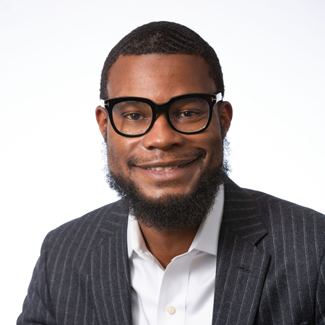Kevin Baisden is a student on a mission—to be the best version of himself and to help others. He got his start at NOVA and then went to Columbia for a B.A. with a joint major in economics and philosophy.

Baisden went on to work in finance, interning at a hedge fund and an asset owner while at Columbia. He then spent a year in fintech consulting before working as an Investment Analyst at Hall Capital Partners. After a few years in a high-paced industry on Wall Street, Kevin decided to apply to law school and landed at Yale. Immediately before law school, Kevin spent his summer as a Summer Associate at a law firm in New York and in the Legal department of an investment bank. Currently, he is a Vice President of Yale Law School’s Federalist Society. He has served as a Research Assistant at the Law School and is an alum of Yale’s Access to Law School’s inaugural fellowship cohort.
Knowing for some time that he wanted to practice law, Kevin aspires to clerk for federal judges, and if fortunate enough, for the Supreme Court of the United States. He then plans to litigate after his clerkship years. Read on for more about him in his own words:
Tell us a little about yourself and your background:
I grew up in the DMV area, and I ended up at NOVA in 2013, at the age of 26. I studied business administration and had lofty aspirations of finishing up at NOVA then transferring to a competitive university, working in finance and becoming an attorney.
While at NOVA as a student, I got my start in modest roles. I worked at the bookstore, a moving company, as a work study for the dean of students and then up to the provost’s office. I graduated in 2016.
When I was at NOVA, there were a few symposia that I presented at. The papers I presented were philosophical in nature with some economic content. It further made me want to study economics and philosophy at Columbia University. I chose this path because I have always been interested in philosophy. I wanted to have the experience of being this “econ” guy with the math and game theory, and have rooting in philosophy, especially analytic philosophy like logic and metaphysics. Effectively, I wanted to be a very well-rounded intellectual. I knew that, after getting my undergrad degree, I would work for a couple of years and then go on to law school.
I really “nerd” out about the law. Even when working in finance, I would spend so much time in the footnotes and end pages, where lawyers put the fine print. I found it interesting from a subject matter perspective. A lot of things lined up timing wise, especially with Yale’s Access to Law School Program that I participated in as an inaugural Fellow.
I knew that Yale Law School was the goal. At the time, I knew it was an extremely competitive opportunity. I knew that it would be improbable, but I knew this was what I wanted. I wanted a bespoke educational experience, intimate class sizes and close proximity to legal scholars.
What did you study at NOVA?
I studied Business Administration.
Tell us about your experience at NOVA (i.e., professors you liked and friends you met):
During my time at NOVA—hands down—one of the most critical people is the late Dr. Joseph Windham. I and a whole host of other people came up underneath him.
All the faculty involved in the honors program were super helpful. These are the people who have helped me figure out what type of foundation I wanted to lay out for myself. I found my people at NOVA, and at subsequent stages of my life, that went on to become my mentors.
Dr. John Min, who taught me economics when I was at NOVA, provided me with the springboard to study it at Columbia. He also wrote my recommendations, as did Dr. Jimmie McClellan.
One of my supervisors at NOVA that I enjoyed working with was Marcus Henderson. We still keep in touch to this day. He is great.
What would you tell a student coming to NOVA?
I would tell an incoming NOVA student to “know what you want out of your education and career.” I would further tell them that they need to figure out how to line things up in a way that will maximize those outcomes. Forget about the odds. I forgot about them when I applied to Columbia and Yale.
If I had the mentality of “this is going to be so hard, why try?” I would not be here. I would continue to tell students to think about how perseverance and grit can best serve as motivation despite the outcomes.
Going from working at the bookstore to my timeline at NOVA, I remember the first assignment I submitted was for Honors English, and I got a D. I took that as a learning opportunity to write better. Now I am a published Wall Street Journal contributor. Learning what you don’t know and learning to master things was vital for me. You can make that change within yourself. Don’t forget how to ask for help.
I would say “stay focused on what your goals are and don’t let anything deter you.”